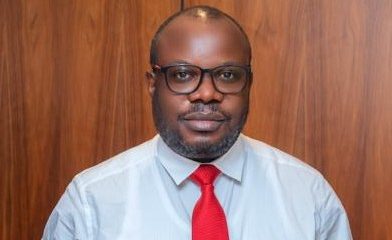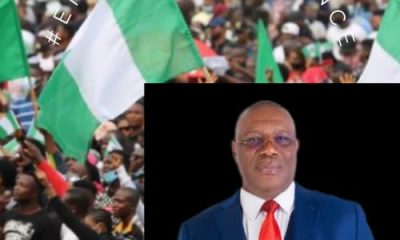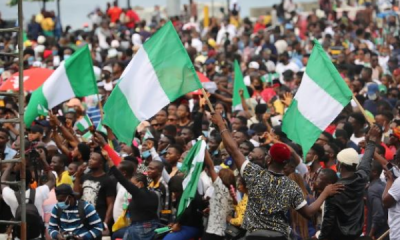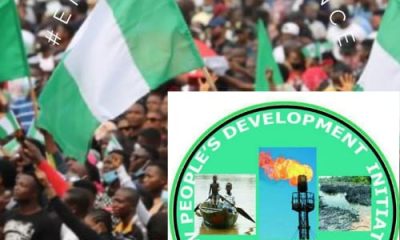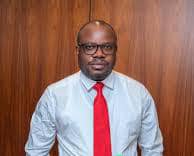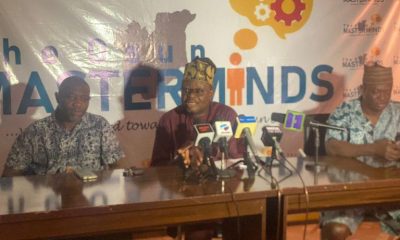Opinion
Opinion:SHOULD LAGOS GO THROUGH ANOTHER RUIN?
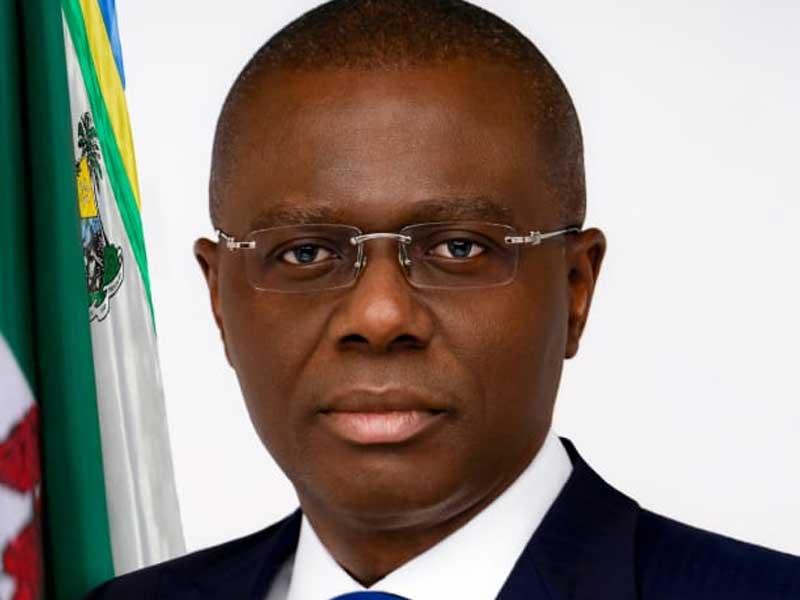
IduwiniVoice
Opinion:SHOULD LAGOS GO THROUGH ANOTHER RUIN?
By Shola Oyeyipo
In Lagos, today, tensions are high and bursting at the seams. Isn’t a protest that is potentially violent another bad idea?
As an instructive takeaway from the story of Sango, the god of thunder and lightning, the Yoruba are quick to warn that, “whoever witnessed how Sango mysteriously vanished into thin air, in evident display of anger, would never knowingly denigrate the King of Koso.”
Obakoso or Olukoso as Sango is otherwise called, actually means the king did not hang himself. This conclusion followed speculations that Sango had hanged himself after the thunder he created struck his palace and burnt it down. He had left the palace for a high rock directly opposite, to re-affirm the potency of his thunderbolt (edun ara).
The fire disaster, which extended to a large part of the city, sparked a riot, forcing people to curse Sango and demand his ouster from the throne. Instead, he left town on his volition, followed by chiefs and members of his royal cult, then known as Baba-Mogba, who tried to persuade him not to quit.
After journeying with him for some time, some of the royal cult chiefs returned to Oyo with the news that the king had hanged himself. The twist, however, according to the other chiefs, who stayed the course, was that Sango was waylaid by Gbonka, one of his generals, who rebelled against him and ignited the crisis that consumed his reign.
Unwilling to fight Gbonka, Sango, history had it, varnished into thin air, only to appear in the sky to destroy Gbonka, and those peddling the rumour that he had hanged himself.
Here was the story of how the popular saying, “Eni Sango ba ti oju e wo’le, ko ni ba w’on bu Obakoso” came about.
Obakoso or Olukoso means the king did not hang himself.
This agelong saying, which seems to sum up the lesson of the last days of Sango, appears useful at this material time in the life of the nation, particularly in Lagos State. In other words, if the outcome of past protests was anything to ponder, then another protest is not advisable.
Some angry youths of this country are unhappy with the state of the nation, especially the economy that is on a downward slope. There’s no doubting the fact that the state of the nation requires some serious reflections with answers provided to the grey areas. But a protest, whose outcome no one could predict, is not the way to go at this delicate period.
Four years ago, the youths of this country protested alleged police brutality, a decision no one could fault, and it lasted many days of destruction across the country, running into billions, with several deaths recorded as well.
Tagged #EndsSARS, the protest designed as a demand for the ban of the Special Anti-Robbery Squad, amongst others, following the alleged excesses of its operatives, was soon hijacked and the nation, especially Lagos, is yet to recover from the ruination that followed.
In February 2023, tensions generated by the paucity of the new Naira peaked, and materialised in violent protests in some states, including Akwa Ibom, Delta, Edo, Imo, Kwara, Lagos, Ondo, Ogun, Oyo, and Rivers.
“During the civil unrest in the different states, several bank branches and ATM points were vandalised, and major roads were blocked,” the United Nations recalled in a recent statement, warning against the idea of another protest.
The UN, therefore, added: “As the turnout for the ‘10 days of rage’ protest is expected to be high, large-scale disruptions to normal economic and social activities cannot be discounted.”
It is against this backdrop that the growing argument against another protest and solidarity with Lagos becomes expedient. This intervention is crucial to the prosperity of the state. It is evident that things are bad. But is an idea that is potentially violent the answer? No!
Like the proverbial hunter, who killed an elephant with a flip of his cap, and ended up with a fleeting moment of glory, the recent Kenya movement, which initially gained recognition across many nations, is fast paling into regrets. The damnation from the exercise is going to take many years to fix.
The man, who allegedly instigated the mass senselessness through his unbridled tongue, a member of the parliament, Hon. George Koimburi Ndung’u, now writhes in regrets. You can’t but ponder how his “Letter of Apology” to the Speaker of Kenya’s National Assembly, Hon. Moses Wetangule, could heal the wanton destruction wreaked on Kenya by the angry mob?
For Lagos, nay Nigeria, the good news, is that a majority of the people, coming from the recent past experiences, are totally against the idea of a protest, which appears designed to wrought yet another destruction on the state, and the nation.
While the demands for a better living condition is sacrosanct, the approach, too, is as important, before the whole essence of the agitation and demand for a better society is lost to the indiscretion of a few, who seek to exploit the situation for personal aggrandizement.
The position taken by students of the various tertiary institutions in Lagos State, who have distanced themselves from the move, and instead, mooted a solidarity walk with the state government under Governor Babajide Sanwo-Olu, is a welcome development.
The students, under the aegis of the National Association of Nigerian Students (NANS), said instead of joining the planned protest, they would embark on a “Solidarity Walk” on the same dates as the protest to support and encourage Sanwo-Olu, who they said has been of great support to them.
Speaking to journalists at a press conference at the Lagos State University College of Medicine (LASUCOM), Ikeja, after a joint meeting, the student leaders across tertiary institutions in the state, said their solidarity walk would also be held from August 1 to 10 to drum support for peace, especially to ensure that the ugly incident of #EndSARS” of 2020 did not repeat itself.
Chairman, National Association of Nigerian Students (NANS), Lagos axis, Comrade Lekan Alimi, who addressed newsmen on behalf of the students of the various tertiary institutions in Lagos State, described the planned nationwide protests against the current hardship in the country as “absolutely uncalled for.”
He said, rather than join the protest, the students in Lagos would prefer to engage in constructive dialogue with governments in achieving collective goals.
While noting that the trying times in the country would soon ease, he appealed to Nigerians to persevere a little more to enjoy the dividends of democracy as being propounded by the President Bola Tinubu administration.
It’s also not in error that some social media influencers have started to campaign against any protest being staged in Lagos. They have realised the kindness, benevolence, and tolerance of the state and did not think the way to reciprocate such good deeds is by destroying its development pride.
It is true that things are tough. It is also true that the economy is still struggling and very true that the situation is breathing down heavily on everyone in the country, including a part of the leadership. But the way to get around it is not by willfully destroying state assets.
Without a doubt, the subsisting argument that protest – peaceful protest – is within the fundamental human rights of the citizens is immutable and an all-time constitutional reality. But what the prospective protesters should also know is that there is no absolute freedom anywhere in the world.
The state’s number one responsibility is to protect life and property. That’s also pegged strongly in the constitution. Therefore, since protesters are unable to tell when and if their peaceful rally could be hijacked and become violent, more so when there are parallel instances to cite, it speaks to wisdom to approach the matter cautiously and differently.
Lagos, a miniature of Nigeria, should not be turned into another theatre of violence and destruction, like the #EndSARS experience. Rather, constructive engagement in the overall interest of the state is the way to go.
Opinion
“Delta: Worst in Educational Institutions Distribution” – Mulade Declares as He Calls for Ijaw Inclusion
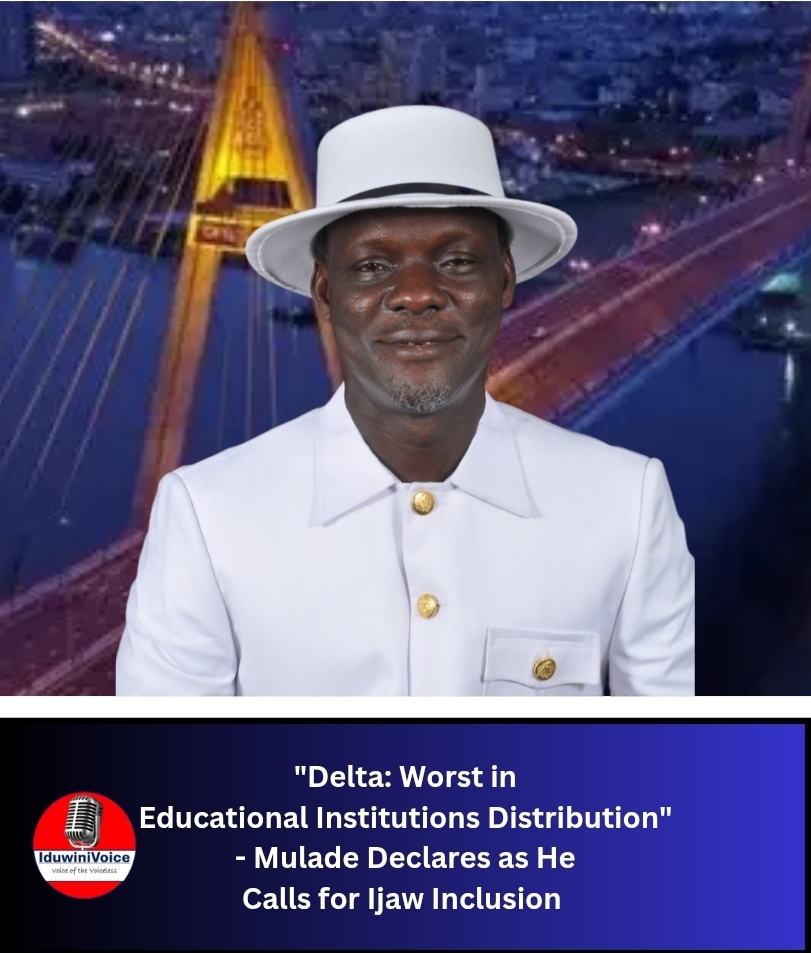
By: Favour Bibaikefie
A development Ijaw leader and development advocate, Comrade Mulade Sheriff, PhD, has accused the Delta State Government of systematic marginalisation and deliberate neglect of Ijaw communities, particularly in the area of educational development and institutional presence.
Mulade, who described the situation as “unjust, provocative and unacceptable in a democratic society,” said the continued exclusion of Ijaw areas from the siting of state-owned educational institutions represents a clear case of structural discrimination, despite the region’s enormous contribution to the economic survival of Delta State.
Dr. Mulade, “It is painful and unacceptable that a people whose land produces greater portion of wealth sustaining this state are treated as second-class citizens when it comes to development especially in the area of higher educational institutions. This is not only unfair; it is dangerous for the unity and future of Delta State.”
The Ijaw-born activist listed the existing state-owned tertiary institutions in Delta State and pointed out that almost all are concentrated outside Ijaw territories, reinforcing a long-standing pattern of exclusion as regards State-Owned Universities such as:
– Delta State University, Abraka;
– Southern Delta State University of Science and Technology, Ozoro; Southern Delta University of Science and Technology, Orerokpe Campus;
– Dennis Osadebay University, Asaba;
– University of Delta, Agbor;
– State-Owned Colleges of Education and Health Institutions:
– Federal College of Education (Technical), Asaba;
– College of Education, Edjeba Road, Warri;
– Delta State College of Physical Education, Mosogar;
– School of Midwifery, Asaba;
– State School of Nursing, Edjeba, Warri;
– College of Nursing Science, Sapele;
– Delta State-Owned Polytechnic Institutions:
– Delta State Polytechnic, Ogwashi-Uku;
– Delta State Polytechnic, Otefe-Oghara;
– Delta State Maritime Polytechnic, Burutu; (with the poorest infrastructure and lacks).
Mulade stressed that out of all these institutions, only one, the Delta State School of Marine Technology, Burutu is located in Ijaw land, a reality he described as “appalling, insulting and indefensible.”
“One institution for an entire ethnic nationality that contributes massively to Delta State’s oil wealth is not just marginalisation; it is a deliberate policy of neglect,” he declared.
The rights activists further lamented that while Ijaw communities bear the environmental burden of oil exploration including polluted rivers, destroyed farmlands and health risks, they are consistently denied the benefits of development, especially in education.
“Our youths are denied opportunities not because they lack potential, but because the government has refused to bring development to our doorsteps. This imbalance is breeding frustration, and must be corrected urgently,” Mulade warned.
The Ibe-Sorimowei of the ancient and oil-rich Gbaramatu Kingdom in Delta State, Chief Mulade Sheriff strongly appealed and called on Governor Sheriff Oborevwori to rise above politics, sentiment and take deliberate steps to correct the imbalance by prioritising the siting of new educational institutions in Ijaw areas, upgrading existing infrastructure and appoint qualified Ijaw sons and daughters as Vice-Chancellor and other principal officers in Delta educational architecture as compensation now.
“Governor Oborevwori must show that he is a governor for all Deltans, not for a select few. The Ijaw people deserve fairness, inclusion and respect. Educational development is not a favour; it is our right,” he stated.
He warned that continued neglect of Ijaw areas could deepen feelings of alienation and undermine the sense of belonging among the people.
Demand for Equity and Justice
Mulade concluded by calling on civil society groups, traditional rulers, youth organisations and stakeholders across Delta State to speak out against structural injustice and demand a more equitable distribution of development.
“This is not just an Ijaw issue; it is a justice issue. A state cannot develop sustainably when a significant part of its population is consistently excluded,” he said.
Opinion
Ijaw Nation Is Watching Delta State 2026 Budgetory Allocations – Dr. Mulade Warns

* As Group Gears Up to Endorse Governor Sheriff Oborevwori for 2027
By: Divine Perezide
Ahead of the 2027 general elections gradually inches closer, the political terain have seen a lot of endorsements at various levels. In Delta, there have been reports of a planned endorsement of governor Sheriff Oborevwori as the sole candidate by a group of Delta Ijaws. This has however, triggered reactions from many stakeholders, including a prominent Ijaw leader, peace and development advocate, Comrade (Chief) Mulade Sheriff, PhD, who has declared that Ijaw votes in 2027 would be determined by projects allocated, adequately funded to completion in the 2026 budget.
The renowned human and environmental rights activist made the declaration at a press briefing after an expanded stakeholders meeting in Warri on behalf of Ijaw Ethnic Nationality in the state.
According to the Ibe Sorimowei of the ancient Gbaramatu Kingdom, the adequate inclusion and funding of projects in the riverine areas will serve as critical consideration for political support, and riverine communities predominantly occupied by the Ijaws and Itsekiri ethnic nationalities.
While he commended the infrastructural development stride by governor Oborevwori in the upland areas, Mulade however lamented the absence of such infrastructural revolution in the riverine areas of the state despite the population density and huge revenue contributions to the state as host to multinational oil and gas companies.
He said, “I want to sincerely appreciate His Excellency, Rt. Hon. Sheriff Oborevwori, for the infrastructural development, which I described as infrastructural revolution in the state, particularly in the upland, and your proposed commissioning of the reconstructed Odimodi-Ogulagha road earlier constructed by SPDC in the 1980’s for their operational convenience and community residents.
“It is imperative to state that some Ijaw communities such as Ogulagha, Torugbene, Oporoza, Akugbene, Ojobo etc. are more densely populated than some local government headquarters in the upland, but they are deliberately deprived of development because of the so-called claim of terrain challenges.
“These communities host multinational oil and gas companies contributing immensely to the state revenue, but without any significant projects,” he lamented.
The Ibe-Sorimowei who reminded the governor of how the Ijaws adopted, supported and stood by him all through the election season, also gave the assurance of massive Ijaw votes come 2027, but one that must be backed by the governor’s commitment to development through massive projects inclusion for the area.
“We (the Ijaws) have created a conducive atmosphere to boost oil and gas production, making Delta the richest state; support security, douse restiveness and support economic stability. It is time for the governor to reciprocate through the 2026 budget with tangible legacy projects,” he asserted.
Speaking further he said, “Your Excellency, permit me to draw your attention to some expected critical projects that must be considered for the Delta Ijaw nation: the Ayakoromo bridge, Omadino-Okerenkoko-Kokodiagbene-Escravos road, Aladja-Ogbe-Ijoh Road, Ojobo-Torugbene road, among others.
“Build a first class Health Centre/General Hospital in riverine community, particularly at Ogulagha Town, to compensate the people for their huge contributions to the state revenue.
On education, he appealed that, “It is worthy of note that every ethnic group in Delta State hosts state university except the Ijaws and the Itsekiris. I want to strongly and sincerely appeal to His Excellency, Rt Hon Sheriff Oborevwori once again, to consider the upgrading of the Delta State Maritime Polytechnic, Burutu, which is a moribund polytechnic, to a campus of the Delta State University, Abraka. This will position the state to explore the blue economy opportunities. Equally too, the state government should, without delay, build a campus of Dennis Osadebe University at Koko to give sense of belonging to the Itsekiris with a special focus on agriculture for Deltans.
“The above mentioned projects constitutes significant live-wire for the Delta Ijaw, and will translate into votes come 2027. We can assure His Excellency, Rt Hon Sheriff Oborevwori, of 100 percent of the entire Ijaw votes come 2027.
“The consideration of revolutionary projects in the riverine areas in the 2026 budget will give a sense of belonging to the people for their huge contributions. Moreover, your commitment to development will write your name in gold, not just seeking their votes during elections.”
Opinion
“Tompolo: A Movement of Transformation” – Prof. Binebai,
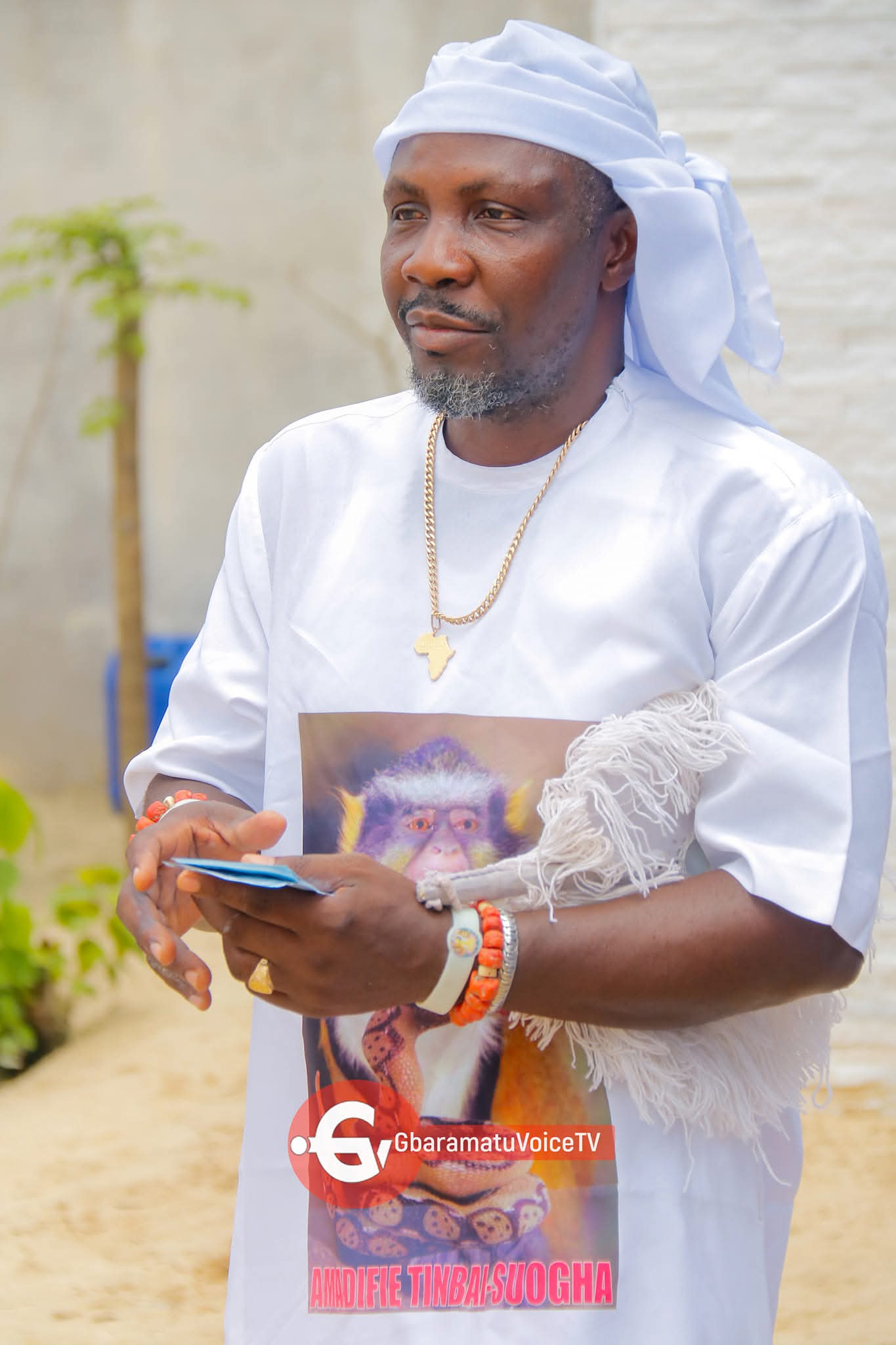
“Tompolo: A Movement of Transformation” – Prof. Binebai,
IduwiniVoice
Renowned Delta-born Professor of Professor of Drama, Dramatic Theory and Criticism, and an Auratorial god, Prof. Benedict Binebai has yet described High Chief Dr. Government Oweizide Ekpemupolo, popularly known as Tompolo as ‘A Movement of Transformation”
In his words, “Tompolo is a multifaceted entity, a veritable institution that defies categorisation, embodying a dynamic force that permeates various aspects of society. As an agency, it represents a powerful catalyst for change, driving progress and innovation in its wake. As a model, Tompolo exemplifies excellence, demonstrating a paradigm of leadership that is at once inspiring and aspirational. His influence extends far beyond the realm of politics, permeating the cultural, religious, and spiritual spheres, where he fosters a sense of unity and shared purpose.
“As a movement, Tompolo is a seismic force, shaking the foundations of complacency and stagnation, and galvanising individuals to strive for a brighter future. His impact is felt across generations, as he empowers young and old alike to become agents of positive change in their communities. In the realm of politics, Tompolo’s leadership has been characterised by a commitment to justice, equality, and the empowerment of the marginalised. His vision for a more equitable society has inspired countless individuals to work towards a common goal, forging a sense of solidarity and shared humanity.
“Culturally, Tompolo has been a luminary, celebrating the rich diversity of Nigerian heritage while promoting a sense of national identity and pride. His influence has helped to preserve traditional values while embracing modernity, creating a unique blend of old and new. Spiritually, Tompolo’s message of hope and redemption has resonated with people from all walks of life, offering a sense of solace and comfort in times of uncertainty. His leadership has embodied a sense of compassion and empathy, inspiring a new generation of spiritual leaders to follow in his footsteps.
“In every sense, Tompolo is a transformative force, a shining example of what can be achieved through dedication, perseverance, and a commitment to the greater good. He is an impeccable movement because his philosophy, his love for society, his cultural activism, his religiosity and leadership grace and skill which is human centered is attracting a large followership, particularly in the Nigerian Delta, where his impact is deeply felt.”
This assertions resonates well with popular sentiments held not just across the Delta of Nigeria but far beyond. Tompolo’s increasing popularity waxes stronger on the pillars of his dedication to homemade ijaw naturality, largeheartedness, stern capability in securing critical national economic assets and the environment, and above all, a detribalized collaborative efforts with other critical stakeholders within and outside the Niger Delta for peace, stability, infrastructural development, and economic process.
(c) IduwiniVoice

